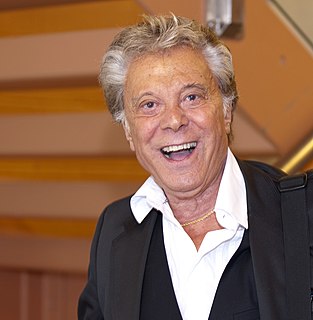History
The British version began in 1956. Marion Ryan was the singer in the popular musical quiz Spot the Tune on Granada Television for seven years, with a total of 209 half-hour programmes. Several stars hosted it, including disc-jockey Pete Murray, Canadian pop singer Jackie Rae, and comedians Ken Platt and Ted Ray. The big band in support was that of Peter Knight and his Orchestra. [1] The contestants had to guess the title of a song after hearing only a small sample. The winner of the most cash must try to name as many £5 tunes as possible within 40 seconds. The show also featured a jackpot tune which reached at least £600 on one occasion.
Marion Ryan was a popular British singer in the 1950s.
Spot the Tune is a British television game show which aired from 1956 to 1962 on ITV. It was produced by Granada Television. It was very similar to the popular American series Name That Tune.
John Arthur Rae, CM, DFC was a Canadian singer, songwriter and television performer.
It was later revived as Name That Tune on ITV. The UK pilot was recorded in 1976 and became a 15-minute slot on the popular entertainment series London Night Out but because the game was so popular, producers Thames Television decided to turn Name That Tune into a half-hour weekly series in 1983. [2] The big band in support was that of Alan Braden and his orchestra.

ITV is a British free-to-air television network with its headquarters in London, it was launched in 1955 as Independent Television under the auspices of the Independent Television Authority to provide competition to BBC Television, that was established in 1932. ITV is also the oldest commercial network in the UK. Since the passing of the Broadcasting Act 1990, its legal name has been Channel 3, to distinguish it from the other analogue channels at the time, namely BBC 1, BBC 2 and Channel 4. In part, the number 3 was assigned because television sets would usually be tuned so that the regional ITV station would be on the third button, with the other stations being allocated to the number within their name.

Thames Television was a franchise holder for a region of the British ITV television network serving London and surrounding area on weekdays from 30 July 1968 until the night of 31 December 1992. It continued as an independent production company until 2003.
Alan Braden is an English composer and musical director who composed the theme tunes for several British sitcoms and light entertainment shows of the 1970s and 1980s.
From 1976 until 1983 it was hosted by Tom O'Connor. Lionel Blair took over from O'Connor in 1984 until the series was dropped from the ITV schedules in 1988. Maggie Moone and Irish trio Sheeba sang the songs that contestants had to guess, while the pianist (whose hands were a regular feature) was Ronnie Price. Nick Jackson served as the announcer.
Thomas Patrick O'Connor is a retired British comedian, TV presenter and actor. He is best known for presenting game shows such as Crosswits, Pick Pockets, The Zodiac Game, Name That Tune, Password and Gambit.

Lionel Blair is a British actor, choreographer, tap dancer and television presenter.
Maggie Moone is a British singer, best remembered for her role on the UK version of Name That Tune.
In 1997 the series was revived on Channel 5 with Jools Holland as the host for 2 series in 1997 and 1998. [3]
Channel 5 is a British free-to-air television network. It was launched in 1997, and was the fifth national terrestrial analogue network in the United Kingdom after BBC One, BBC Two, ITV, and Channel 4. It is generally the fifth-placed network in the country in audience share, and has been since its inception.

Julian Miles "Jools" Holland, OBE, DL is an English pianist, bandleader, singer, composer and television presenter. He was an original member of the band Squeeze and his work has involved him with many artists including Sting, Eric Clapton, Mark Knopfler, George Harrison, David Gilmour, Magazine, The The and Bono.
On 5 May 2007 the show was briefly revived for Vernon Kay's Gameshow Marathon on ITV, with Peter Dickson as announcer.

Gameshow Marathon was a British game show, broadcast on ITV from 17 September 2005 to 26 May 2007. After a quick retrospective look at the history of the particular show, the show itself is recreated. This involved recreating the original set and using original opening programme titles, including the appropriate producer ident. All participants are celebrities, and any prizes won go into a "Viewer Prize Mountain" which is awarded to a viewer via a phone-in competition.






